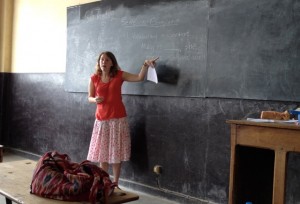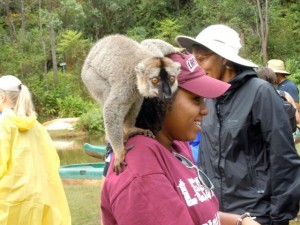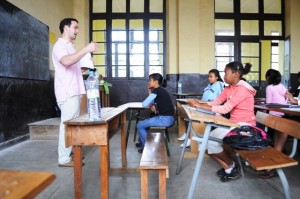
Erin D’Amelio ’13 works with the Lafayette Initiative for Malagasy Education students.
In most Malagasy villages, it’s a tradition to share a drink from a coconut with visitors. So when a group of 10 Lafayette students visited a village during their travels in Madagascar over the January break, a farmer welcomed them by climbing up a large coconut tree and knocking down enough for everyone in the group. Experiences like that are what make it difficult for John Bolton ’13 (Darien, Conn.) to put into words the purpose of Lafayette Initiative for Malagasy Education (LIME).
LIME is a peer mentoring program to help Malagasy students overcome the language barrier and other disadvantages to pursue their dreams of receiving a college education at an American school. LIME is a partnership among Lafayette, the U.S. Embassy in Madagascar, and American School of Antananarivo.
“I have trouble explaining to my friends sometimes what the LIME program is and why I’m a part of it,” says Bolton, a mathematics-economics major. “On the surface, it may seem that we just go to Madagascar to lecture students about the SATs. In reality, it’s so much more. We don’t teach the students; we work with them. We aren’t their professors; we’re their friends. It’s important for them to have us as an outlet and resource to practice their English in an informal setting, as this is one of the biggest barriers for them to gain acceptance to a U.S. college or university.”

Taneesha Tate-Robinson ’13 with a lemur
After spending their first weekend staying with a woman named Henrietta near the Perinet rainforest in Andasibe, it was time for the team to get to work with a select group of high school students at Lycée Andohalo in the Malagasy capital of Antananarivo. For three hours each morning, they worked with LIME 2, a group of juniors going through the program for the first time. In the afternoon, they introduced an advanced curriculum to LIME 1, seniors who went through the program last year. Because Malagasy students do not take SATs or apply to college until after they graduate, next year’s LIME team will work with three groups: juniors, seniors, and graduates applying to college. On weekends, the group traveled around the country to soak up its history and culture, including trips to spend time with a Peace Corps volunteer in the beach town of Mahanoro and to the U.S. Embassy.
On one of the last days the Lafayette group spent in Madagascar, the entire school attended an assembly where the head of the school announced that the LIME students’ grades had risen across the board since they started participating in the program. A representative from the U.S. Embassy and local press also attended. Each year, LIME accepts about 10-14 students from hundreds of applicants.
With only 142 Malagasy students studying at American colleges and universities—most of them graduate students—it’s a group that is vastly underrepresented. But LIME isn’t about increasing Malagasy enrollment for the sake of diversity, it’s about giving students an opportunity for change like no other.
Elisabeth Day ’14 (Greenwich, Conn.), an art and English double major, didn’t understand until she got to Madagascar why students don’t want to attend universities in their home country. Day worked with a talented student named Rebekah, who plans to apply to Lafayette.

John Bolton ’13 speaks with the students.
“Rebekah told us that a Malagasy degree means nothing to the rest of the world,” explains Day. “If she were to leave the country and try to get a job somewhere else, they would say she had no university education. This frustrates her but also motivates her to work harder every day to get a respectable degree and education where she can use her knowledge to help her country.”
It was an eye-opening experience for the LIME team to see how complicated studying in the U.S. can be for foreign students. Erin D’Amelio ’13 (Mount Bethel, Pa.), an English and French double major, is finding out how hard the language barrier is to overcome studying abroad in France this semester. For most Malagasy students, English is their third language behind Malagasy and French. Bolton says the trip inspired him to learn a second language.
Bolton wasn’t the only one who took a hard look at himself while in Madagascar. Day describes the cultural exchange as a two-way street. The Malagasy environment for learning is a far cry from the top-notch resources she sometimes takes for granted at Lafayette.
“I left Madagascar changed,” says Day. “I have never sat in a classroom with broken windows and no electricity. Yet they don’t think twice about it because they come to school to learn. The surroundings seem irrelevant. Even through a three-hour class, they were never distracted; they always had their eyes on the board. And it was their choice.”
The Malagasy students’ progress in such a short amount of time is proof that LIME is making huge strides in the right direction. Like Rebekah, another student named Antsa wants to study in the U.S. so he can share the Malagasy culture and use what he learns to help others in his country. But it was the way he expressed that desire that amazed D’Amelio the most.
“Antsa shared his personal essay with me, and I was so impressed with what he wrote,” she says. “The biggest hurdle for the students is the language barrier; for the new group, this was especially difficult. Yet Antsa’s essay was articulate and really demonstrated his drive and how much he learned over the two weeks we were there. I only had to correct one or two errors; the rest was so great.”
Other members of this year’s LIME team are Kara Enz ’13, Madeline Gambino ’14, Edwin Liriano ’14, Caitlin Mitchell ’13, Eduardo Rodriguez ’14, Taneesha Tate-Robinson ’13, and Carter Tindell-Hall ’14. LIME adviser Dave Stifel, associate professor of economics and co-chair of international affairs, accompanied the group to Madagascar.



5 Comments
I am Clara and I have taken part in the LIME program since 2011. I think that LIME is a program that Malagasy students do need nowadays!!!!!
To become an American-educated Malagasy is the dream of most after they finished their secondary school. But they don’t know what they need to do to study in the United States. As LIME is the partnership between Lafayette College and Lycée Anhohalo (a public secondary school in Madagascar), it really helps Malagasy students to choose what they are going to do after their baccalaureate exam. The LIME team from Lafayette showed us the process to study in America. They also helped us to pay for test fees including SAT and TOEFL.
About our English — we can’t deny that speaking with Americans is not always easy, but communicating with them during their trip in Madagascar and through the internet helps us to improve our English. The LIME team was also with us when we filled out our application and CSS profile. Last but not least as professor Stifel always said is our personal statement. Students from Lafayette helped us to do it; just as in my case I had no idea about what to write, but they helped me learn how to write a good, simple essay.
They really inspire me and encourage me to keep on working hard. I’m grateful for the LIME team including profesor Stifel, the other professors who helped him since 2011 and all the students from Lafayette who participated.
I am one of the “English Micro Access Scholarship” graduated students. I’m 17 years old .I studied at Jules Ferry High School here in Madagascar and I want to apply be a member of your program. I want to continue my studies in the United States. Could you please tell me what I should do to be accepted?
Please contact Prof. Stifel (stifeld@lafayette.edu).
Changing lives indeed. These kids would never have the chance if this program didn’t exist.
Thank you LIME. I appreciate it, I’m sure they do too.
Comments are closed.